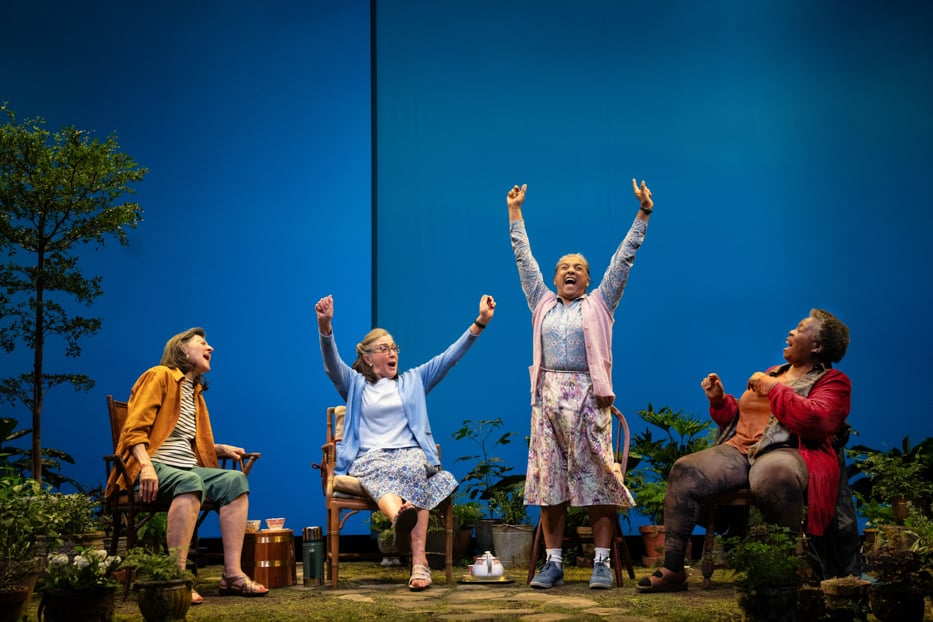 Left to right: Vi (Mary Lou Rosato), Sally (Sandra Shipley), Lena (Rita Wolf), and Mrs. Jarrett (LaTonya Borsay) in the Yale Repertory Theatre's production of Caryl Churchill's Escaped Alone. Joan Marcus photo, courtesy of Yale Repertory Theatre.
Left to right: Vi (Mary Lou Rosato), Sally (Sandra Shipley), Lena (Rita Wolf), and Mrs. Jarrett (LaTonya Borsay) in the Yale Repertory Theatre's production of Caryl Churchill's Escaped Alone. Joan Marcus photo, courtesy of Yale Repertory Theatre.
Four elderly women sit in a quaint English garden, making small talk.
Then, out of nowhere, a piercing ring, a low rumble, a blinding flash of lights, and darkness. Mrs. Jarrett, the newcomer to the quartet, stands in a spotlight and narrates an apocalypse.
“Four hundred thousand tons of rock paid for by senior executives split off the hillside to smash through the roofs, each fragment onto the designated child’s head,” she says. She goes on to describe food shortages, birth defects, and societal collapse.
As quickly as the prophetic scene arrived, it’s gone. The lights blink back on. Mrs. Jarrett returns to her former, regular self. The women start nattering on again.
Over the course of Caryl Churchill’s 55-minute play Escaped Alone—which began previews last Friday at the Yale Repertory Theatre and officially opens March 14—Mrs. Jarrett (played by LaTonya Borsay) declaims seven such monologues. She tells of flood, famine, fire, drought, disease, and war, among other climate catastrophes. Between these glimpses of disaster, the four women continue talking in the garden.
Directed by Yale Repertory Theatre Resident Director Liz Diamond, Escaped Alone attempts to highlight the contrast and convergence of everyday life and utter devastation. As the production unfolds, Mrs. Jarrett announces ever-more-dramatic crises. The audience also learns of more quotidian chaos in the lives of the four women. It is revealed—in overlapping, sometimes nonsensical dialogue—that Vi (Mary Lou Rosato) spent time in prison, that Sally (Sandra Shipley) is terrified of cats, and that Lena (Rita Wolf) hates her job and is depressed.
Escaped Alone premiered in 2016 at London’s Royal Court Theatre. On the surface, it aptly characterizes the current moment. The crises it foretells—global zoonotic disease outbreaks and unavoidable toxins, rising ecofascism and corporate greed—are those which plague our world.
Diamond, the director, called the show “weirdly prescient.”
“I suppose I find it more timely than ever,” she said.
Eric, an audience member who chose not to give his last name, said after the show that “there’s a lot to think about—the juxtaposition of the catastrophe with the four women sitting in the garden is thought-provoking.”
For some, however, Escaped Alone didn’t quite hit home. Several people walked out of the theater during the performance. Others expressed confusion about or distaste for the show's experimental nature.
“It was different—I kind of lost track,” Suzy Krawczyk said after the show. “I think it was the apocalypse?”
“I could have found a better way to spend the evening,” said Jacques Gauthier. “[It was] forgettable—I don’t even remember the name of it. But there were some amusing things in there.”
The Yale Rep’s production of Escaped Alone also raises more fundamental questions about whether, in 2024, apocalyptic prophecy has run out of steam. Is it still worth hitting us over the head with the threat of disaster?
When the play debuted over eight years ago, the British and American left both had hope that change was on the horizon. Jeremy Corbyn and Bernie Sanders had momentum, and a Green New Deal seemed like a real possibility. Escaped Alone makes sense as a piece of art emerging from that political moment. The play’s insistence on the fact that things are going to get really bad if nothing changes was a rallying cry. Critics at the time reviewed the show positively, and commented on its political relevance.
Today, however—after a global pandemic, a global shift rightwards, worsening wildfires, war in Gaza and Ukraine—the hopelessness of Escaped Alone doesn’t seem to strike the right note.
This is not to say that wildfires, hurricanes, and floods aren’t bad, but that dark, portentous storytelling as a form of climate activism has not delivered on its promises. As it stands, climate anxiety, particularly among young people, is already widespread; Escaped Alone delivers a warning to an audience already painfully aware.
Foretelling a terrible future also seems to elide the fact that climate change is already happening. Mrs. Jarrett’s dramatic pronouncements disguise the fact that global warming often manifests in what the scholar Rob Nixon calls “slow violence”—a process that is “incremental and accretive” rather than dramatic and eye-catching. (Critics found similar problems in Adam McKay’s 2021 film Don’t Look Up and Scott Z. Burns’ 2023 miniseries Extrapolations; Daniel Goldhaber’s 2022 film How to Blow Up a Pipeline, for one, takes a different storytelling tack.)
In the final monologue of Escaped Alone, Mrs. Jarrett repeats, over and over, “terrible rage, terrible rage, terrible rage.” It’s striking, and off-putting, and she’s right that we should be angry—we are. But perhaps now is the time to instead tell a story about what we might do with that anger.
Escaped Alone runs March 8 to March 30 at the Yale Repertory Theatre, located at 1120 Chapel Street. Tickets are available here.